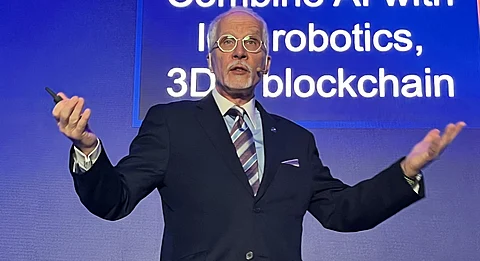

As the world continues to grapple with post-crisis challenges, CEOs are rewriting the playbook for success. From managing geopolitical risks to addressing talent shortages, leaders are turning to AI and sustainability as the cornerstones of their strategies for the years ahead. David Furlonger, Distinguished VP Analyst at Gartner, shared key insights from Gartner’s global CEO survey, shedding light on the evolving priorities of executives and what CIOs must do to support these initiatives.
Artificial Intelligence has emerged as the single most disruptive technology on the horizon. According to Furlonger, 74% of CEOs identify AI as the top technology expected to impact their industries over the next three years. This underscores AI’s growing role as an enabler of what Gartner calls “AI-enabled dynamic capacity”—the ability to adapt and scale operations in real time.
Notably, CEOs predict that AI will increase the span of control for people managers by 18%, streamlining workflows and enhancing decision-making processes. This shift toward AI-augmented management reflects the broader trend of using technology to empower human capabilities.
To support CEOs' growth agendas, Chief Information Officers (CIOs) must pivot their focus toward enabling dynamic capacity across five critical dimensions:
Geographic – Expanding into new markets and regions with agility.
Operational – Streamlining processes and driving efficiency through automation and AI.
Customer – Enhancing customer experiences with personalized, data-driven insights.
Risk – Building resilience against geopolitical, economic, and cybersecurity risks.
People – Integrating human talent with machine intelligence to create a hybrid workforce.
By addressing these priorities, CIOs can help their organizations remain competitive in an increasingly unpredictable landscape.
AI is driving what Furlonger calls “a new era of autonomous business.” From decision-making to operations, organizations are shifting toward self-sufficient systems that reduce dependency on manual intervention. However, this transformation is far from complete. 67% of CEOs admit that their current operating models are not fit for an AI-driven world.
This gap highlights an urgent need for transformation at both the strategic and operational levels. Businesses that fail to adapt risk being left behind as their competitors embrace the efficiencies and innovations of autonomous systems.
The workplace as we know it is undergoing a seismic shift. According to Gartner’s survey, 68% of organizations are working on a strategy to integrate human employees and machines, including AI agents and robots. The “human-only” workforce is becoming a relic of the past, replaced by hybrid teams that blend human creativity and empathy with machine precision and scalability.
This integration isn’t just about efficiency—it’s about redefining what work looks like in the 21st century. Organizations that succeed will be those that cultivate a culture of collaboration between humans and machines, leveraging the strengths of both to drive innovation.
As we approach 2025, the message from Gartner’s CEO survey is clear: Transformation is no longer optional. Both CEOs and CIOs must take bold steps to align their strategies with the demands of an AI-driven, post-crisis world. Here’s how:
Invest in AI Readiness: Build operating models that are designed to thrive in an autonomous business environment.
Focus on Sustainability: Addressing environmental, social, and governance (ESG) challenges is not just good for the planet—it’s a business imperative.
Build a Hybrid Workforce Strategy: Equip human employees with the tools and training needed to collaborate effectively with machines.
Enhance Risk Management: Develop robust frameworks to mitigate risks associated with geopolitical instability and cybersecurity threats.
Prioritize Customer-Centric Innovation: Use AI to deliver hyper-personalized experiences that drive customer loyalty and satisfaction.
The findings shared by David Furlonger paint a vivid picture of the challenges and opportunities CEOs will face in the coming years. AI, sustainability, and workforce transformation are not just trends—they are the pillars of future success. For CIOs, supporting these initiatives requires a proactive approach to innovation and a deep understanding of the evolving business landscape.
The future is fast approaching, and the organizations that act now will be the ones to lead in 2025 and beyond.
